News and events
Latest news and upcoming events
News: HUNGer Project
 Congratulations to Prof Paul Kelly and his team who have been awarded full funding for their proposal 'Novel tools for evaluating intestinal dysfunction in children and adults with malnutrition disorder'.
Congratulations to Prof Paul Kelly and his team who have been awarded full funding for their proposal 'Novel tools for evaluating intestinal dysfunction in children and adults with malnutrition disorder'.
The HUNGer project aims to establish a team of internationally leading researchers to develop a programme of work to directly address the United Nations (UN) Sustainable Development Goal 2: End hunger, achieve food security and improve nutrition, and promote sustainable agriculture. We derived the name HUNGer from Health, Undernutrition, Nutrients and Gut dysfunction.
ACMYCO Nutritional Research Study
If you would like to participate in the research study or you have any doubts, please contact the Study Team by either of the following methods: Email: protein@imperial.ac.uk
Telephone: 07522887666
What is the PURPOSE of this study?
Type 2 Diabetes Mellitus (T2DM) is a disease in which blood sugar is not well controlled. This is because the body fails to produce or sense insulin, which is the hormone that controls blood sugar. Research studies have reported that South Asians are nearly four times more prone to develop T2DM and have a poorer blood sugar control than people with European origins.
Diet is the cornerstone treatment for T2DM. People with T2DM are recommended to modify their diets towards a healthy and balanced diet including low glycaemic index and fibre-rich foods. Foods high in fibre reduce the incidence of T2DM and helps controlling blood sugar in people with T2DM.
Mycoprotein is a meat-free food high in both fibre and protein as well as low in fat, which is sold in many supermarkets across the UK under the brand name of “Quorn” in different forms (i.e. nuggets, mince, etc.). We have previously demonstrated that mycoprotein improves blood sugar control in healthy overweight and obese humans. However, we do not know what are the effects of mycoprotein in people with T2DM and if there is a different effect between South Asians and people of European origin.
In addition, guar gum is a type of fibre that is known to be very good at controlling blood sugar in people with T2DM.
Therefore, in this study we will investigate the effects of different types of protein (soy, chicken and Mycoprotein (Quorn)) with and without a fibre called guar gum on blood sugar control and appetite in South Asian and people with European origins with Type 2 Diabetes.
The aim of this study is to see whether mycoprotein given only once (acutely) improves blood sugar control and appetite in South Asians with Type 2 Diabetes and whether this effect is greater with guar gum.
Who is ELIGIBLE for the ACMYCO study?
• People who has been diagnosed with Type 2 Diabetes and are not taking insulin
• Have South Asian (Afghanistan, Bangladesh, Bhutan, Maldives, Nepal, India, Pakistan and Sri Lanka) or European ancestry
• Are aged from 18 to 70 years
• Have a Body Mass Index ≤ 35.0
For a full list of the inclusion and exclusion criteria please see Inclusion and Exclusion Criteria.
You are SUITABLE to participate if you meet the following criteria:
• Diagnosed with Type 2 Diabetes Mellitus who are not taking insulin
• South Asian (Afghanistan, Bangladesh, Bhutan, Maldives, Nepal, India, Pakistan and Sri Lanka) or European ancestry
• Aged 18 to 70 years
• Body mass index ≤ 35.0
You are NOT SUITABLE to participate if you meet any of the following criteria:
• Non diagnosed with Type 2 Diabetes Mellitus
• Mixed ancestors
• Diabetic taking any of the following medications:
• Insulin
• Diabetic medication (Except from metformin and oral hypoglycaemic which are allowed)
• Orlistat
• Have a gastrointestinal, heart, pancreas disease
• Cancer
• Infection requiring antibiotics
• History of alcohol or drug abuse
• Any condition involving the imbalance of hormones
• Are currently participating in another research study or have taken part within 3 month of study entry
• Currently smoking
• Allergy to breathing mould, penicillin, egg, soy
• Asthmatic
• Hypothyroidism
• Weight change of ≥ 5% of total kilograms in the preceding 3 months
• Shift workers
• Vegetarian
• Medical implants that require batteries such as heart pace makers.
Where does the study take place?
The screening visit and the study visits take place at Imperial Clinical Research Facility (ICRF) located in the Imperial Centre for Translational and Experimental Medicine (ICTEM) at Hammersmith Hospital, Du Cane Road, London, W12 0NN.
Closest tube stations are East Acton, White City (Central Line) and Wood Lane (Circle and Hammersmith and City lines). Buses that stop nearby are: 7, 70, 72, 272, 283.
What does the study involve doing?
You will be asked to attend the ICRF for a total of seven separate visits: one screening visit (approximately 1 hour long) and six separate visits of approximately 5 hours long.
During the screening visit we will check your study eligibility (involves one blood test). During each study visit, you will be asked to consume a meal containing a source of protein (soy, chicken, mycoprotein with or without a fibre called guar gum). A total of 9 blood samples will be taken throughout each study visit from a cannula over 3 hours. At the end of the study visit a buffet meal of pasta will be served and you will be free to go home.
What do we measure?
We measure blood sugar levels, insulin hormone in blood, energy intake and appetite.
Will I get reimbursed?
You will be reimbursed £30 per study visit up to a maximum of £180 on completion of the study.
In addition, travel expenses and study meals are covered.
Is it Safe?
‘Yes’. We have medical support throughout the study from Dr. Anne Dornhorst, Consultant Physician.
Participation is voluntary and you may withdraw from the study at any time without giving any reason.
How can I participate in the trial?
If you would like more information, or are interested in taking part in this trial, please contact the study team on Email: protein@imperial.ac.uk
Telephone: 07522887666
Event: Nutrition Futures Conference 2021
The Nutrition Society organises a number of scientific conferences each year, as well as contributing to joint events with other organisations worldwide. Annually, the Society hosts two student focused conferences, one in Ireland and one in the UK. The UK conference is entitled 'Nutrition Futures', which was known as the 'Student Conference' until 2017 and is traditionally held in September.
Over two days, the Nutrition Futures Conference attracts approximately 150 undergraduates and postgraduates studying or have studied on nutrition related courses, as well as prospective students intending to study food and nutrition or dietetics related subjects. In addition to scientific lead plenary lectures, the conference also offers original communication sessions, a career panel session and sessions offering career support, plus a vibrant evening networking programme.
We are excited to announce that Imperial were successful in their application to host the conference in 2021. We hope it will be a great experience and an opportunity to highlight Imperial as an important institution in the field nutrition research.
This year the conference is being held at Coventry University Sept 8-9, you can find more details about it here: https://www.nutritionsociety.org/events/nutrition-futures-2020
Past news and events
Seminar: Food Allergy and Intolerance: Sifting fact from fiction
 The Centre for Translational Nutrition and Food Research is proud to invite Emeritus Professor John Warner from Imperial's Faculty of Medicine, National Heart & Lung Institute, to discuss, 'Food Allergy and Intolerance: Sifting fact from fiction'.
The Centre for Translational Nutrition and Food Research is proud to invite Emeritus Professor John Warner from Imperial's Faculty of Medicine, National Heart & Lung Institute, to discuss, 'Food Allergy and Intolerance: Sifting fact from fiction'.
John Warner did his undergraduate medical training in the School of Medicine, University of Sheffield and his initial paediatric experience was in the Children''s Hospital, Sheffield working under the mentorship of Professor Ronald Illingworth. He acquired his MRCP(UK) having worked for two years in adult medicine with a particular focus on respiratory disease. He then moved to the Hospital for Sick Children, Great Ormond Street as a Registrar and subsequently a Research Fellow and then Senior Registrar rotating through Queen Elizabeth hospital, Hackney and the London hospital. His first consultant post was a joint appointment between St Mary''s and the Brompton hospital. He then moved to Southampton as Professor of Child Health in 1990 and finally back to as Professor of Paediatrics and Head of Department Imperial College St Mary''s hospital campus from September 2006 to April 2013. He continues as Professor of Paediatrics and since 2008 he has been the Director of Research for the Women and Children''s Clinical Programme Group, Imperial College Healthcare NHS Trust (ICHT). He is the theme lead for paediatrics in both the Biomedical Research Centre in ICHT and the NW London CLAHRC (Collaboration for Applied Health Research and Care) He is President of the Academic Paediatrics Association
His research has focused on the early life origins of asthma and related allergic and respiratory disorders. He has published over 400 papers in scientific journals on these topics. He was Editor in Chief of the journal Pediatric Allergy and Immunology from 1997-2010 and chairman of the paediatric section of the British Society for Allergy and Clinical Immunology for 5 years until 2010. He is also a member of the Speciality and Training committee of the World Allergy Organisation and a past Trustee of the charity known as The Anaphylaxis Campaign. He was a member of the Advisory Committee for Novel Foods and Processes of the Food Standards Agency for 12 years until 2012 and was recognised for his work in food allergy research by the award of an OBE in 2013.
Event: Improving our understanding of the metabolic interplay between nutrition and physical activity (IN-PACT)
UK Nutrition Research Partnership (UK NRP) Workshop
Online Workshop: Monday 11th January 2021
Improving our understanding of the metabolic interplay between nutrition and physical activity (IN-PACT)
Eating a healthy diet and engaging in regular physical activity remain the cornerstones for weight maintenance and the prevention of metabolic diseases. A close interplay between nutrition and physical activity is generally accepted, but progress in understanding its precise nature is hindered by a lack of disciplinary integration. Nutritional scientists have contributed substantially to development of energy and nutrient needs for a variety of populations that inform public health guidelines for dietary intakes. However, the influence of physical activity, the research domain of exercise scientists, on these guidelines is rarely considered.
Physical activity can profoundly modulate physiological and behavioural responses to nutrition, and vice versa. Ignoring the metabolic interactions between nutrition and physical activity limits the utility and potential of dietary guidelines.
Workshop aims
The overall challenge of the IN-PACT workshop is to develop a better understanding of the interplay between nutrition and physical activity and their effects on human metabolism at the mechanistic level. By better understanding the close metabolic interplay between nutrition and physical activity, it will be possible to develop integrated evidence-based dietary guidelines with improved potential to transform long-term health.
The IN-PACT Workshop will:
1. Bring world-leading nutritional and exercise scientists together to bridge the disciplinary gap and work collaboratively to define a research agenda that will enhance the nutrition field
2. Facilitate the integration of fundamental metabolism and systems researchers into the field to drive a focus on developing mechanistic understanding in nutrition research
3. Support close interactions between researchers at all career stages to ensure new research networks are developed, new ideas can flourish with input from senior leader experience, and collectively contribute to the sustainability of the field.
IN-PACT Workshop Leads
Dr Gareth Wallis
School of Sport, Exercise and Rehabilitation Sciences
University of Birmingham
Dr Edward Chambers
Section for Nutrition Research
Imperial College London
Seminar: Manipulation of the gut and eating behaviour; what is the impact of obesity surgery on food choices?
 The Centre for Translational Nutrition and Food Research is proud to invite Dr Alex Miras from Imperial's Department of Metabolism, Digestion and Reproduction to discuss, 'Manipulation of the gut and eating behaviour; what is the impact of obesity surgery on food choices?'.
The Centre for Translational Nutrition and Food Research is proud to invite Dr Alex Miras from Imperial's Department of Metabolism, Digestion and Reproduction to discuss, 'Manipulation of the gut and eating behaviour; what is the impact of obesity surgery on food choices?'.
Alex is currently a Senior Clinical Lecturer and Consultant in Endocrinology at Imperial College London and interested in the mechanisms through which lifestyle interventions, pharmacotherapy, bariatric surgery and medical devices improve weight, metabolic control and diabetes-related microvascular complications.
Seminar: AI-designed precision nutrition using DreamLab
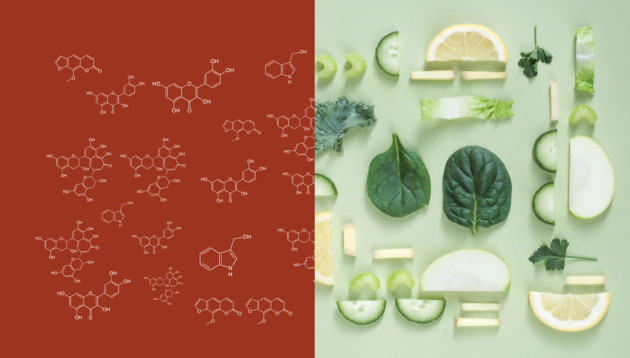 The Centre for Translational Nutrition and Food Research is proud to invite Dr Kirill Veselkov from Imperial's Department of Surgery & Cancer to discuss, 'AI-designed precision nutrition using DreamLab'.
The Centre for Translational Nutrition and Food Research is proud to invite Dr Kirill Veselkov from Imperial's Department of Surgery & Cancer to discuss, 'AI-designed precision nutrition using DreamLab'.
Dr. Veselkov's research group focuses on developing computational methods that can make a difference in data-driven global health and disease. He has led the development of a series of field-changing data analytics frameworks to augment emerging molecular ("-omics") profiling technologies into clinical decision support, and population health management. His group expertise combines the use of a diverse range of computational techniques from signal processing, imaging informatics, machine learning, natural language processing and highperformance computing for information extraction from heterogeneous biomedical datasets. His translation interests are precision medicine and digital pathology. Dr Veselkov has received a World Economic Forum (WEF) Young Scientist Award, and currently serves as an active member of the WEF Global Agenda Council on the Future of Computing.
Seminar: Eating insects: which, when, where and why?
 The Centre for Translational Nutrition and Food Research is proud to invite Dr Tilly Collins from Imperial's Centre for Environmental Policy (CEP) to discuss, 'Eating insects: which, when, where and why?'.
The Centre for Translational Nutrition and Food Research is proud to invite Dr Tilly Collins from Imperial's Centre for Environmental Policy (CEP) to discuss, 'Eating insects: which, when, where and why?'.
Dr Collins is a senior academic in the CEP and hold both Research and Teaching positions.
Her research interests are broad and she has a personal portfolio in aspects of Urban Ecology; under the 'Missing Bricks' scheme and via John Mumford's Risk Management Team within the Environmental Security and Governance Group which contributes to a number of projects nationally and internationally. In this group she contributes to field data flow and management for Target Malaria.
Dr Collins also contributes regularly to the wider media on ecological and entomological topics and has appeared on (amongst others) Radio 4's TODAY show, Blue Peter, several 'Insect Eating' documentaries and on the pages of many popular and specialist magazines.
Dr Collins's PhD (2001) was in the ecology of the aphid fauna of willow trees and gives her roots in applied entomology and crop pest biology. After a post doctoral appointment in the Department of Environmental Science & Technology (DEST) of Imperial College, and a teaching appointment in the School of Biology at Leeds University, she returned to Imperial College's Department of Biology in October 2003 where she remained based until 2012. Whilst there she was the Senior Womens' Tutor, convened the second undergraduate year for Biology Degrees, several undergraduate modules and the created the popular MSc in Ecological Applications.
In her current teaching portfolio she convenes and teaches MSc Research Design and Statistics as well as having a responsibility for the MSc Ecology delivery. She oversee the CEP's contribution to teaching of Natural Resource Management into the Biology Department. She am also the Senior Women's Tutor for the CEP and have received Rector's Awards for Excellence in Teaching and for Excellence in Pastoral Care.
In addition to her work at Imperial College, she was a Senior Lecturer in Entomology at Harper Adams University College, is an Associate with the Environmental Consultancy, Collingwood Environmental Planning, does outreach to encourage science and Entomology in schools, is a School Govrenor and a Queen's Park rangers supporter.
Seminar: Near "zero-cost" paper-based electrical gas sensors for measuring food quality
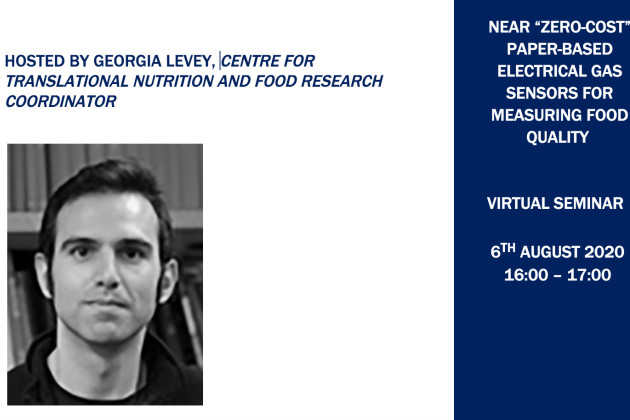 The Centre for Translational Nutrition and Food Research is proud to invite Dr Firat Güder from the Department of Bioengineering, Imperial College London to discuss, 'Near "zero-cost" paper-based electrical gas sensors for measuring food quality'.
The Centre for Translational Nutrition and Food Research is proud to invite Dr Firat Güder from the Department of Bioengineering, Imperial College London to discuss, 'Near "zero-cost" paper-based electrical gas sensors for measuring food quality'.
Abstract: Cellulose paper is a low-cost, flexible and biodegradable material that is ideally suited for the fabrication of near zero-cost sensors using high-volume printing methods. We have recently discovered that the intrinsic properties of cellulose as a highly hygroscopic biopolymer enable measuring gaseous analytes in a fundamentally new way. This new method of sensing gases allows detecting volatiles formed by the degradation of protein rich food products to measure food quality electrically. In this talk, Dr Guder will tell the story of paper-based electrical gas sensors (PEGS), their application in monitoring food spoilage and its future as a commercial solution to reduce food waste.
Bio: Dr Firat Güder is a senior lecturer (US equivalent associate professor) in the Department of Bioengineering at Imperial College London. Prior to his appointment at Imperial, he was a research fellow in the group of Prof. George M. Whitesides at Harvard University in the Department of Chemistry and Chemical Biology. He has a PhD in Microsytems Engineering (summa cum laude) from the University of Freiburg, Germany, and a BSc in Computer Engineering (First Division) from the University of New Brunswick (UNB), Canada. Over the years, his achievements have been recognized through numerous awards such the UNB Class of 1939 Scholarship, N. Myles Brown Scholarship, Governor Thomas Carleton Scholarship, KU Leuven International Scholarship, Furtwangen University MTM Scholarship, German Research Foundation International Research Fellowship, Tom West Analytical Fellowship, 2018 UNB Young Alumni Achievement Award and most recently Imperial College President's Medal for Outstanding Early Career Researcher. Firat and his team, work in the interface of material science, electronics, computing, chemistry and biology. His group focuses on the development of new materials, fabrication of low-cost sensors/actuators with the eventual aim of transforming the devices developed into fully functional portable systems for use in healthcare, agricultural and food sciences. In addition to his peer-reviewed papers, he is an inventor of multiple patents and cofounded four startups based on his own research. His research at Imperial is sponsored by the Wellcome Trust, EPSRC, BBSRC, GE Healthcare, The Royal Society, Analytical Chemistry Trust Fund, Innovate UK, EIT Health, Gates Foundation and others. For more information on Firat and his research activities, please visit his website at www.guderesearch.com
Seminar: Unravelling the mechanisms for nutrient sensing in the gut
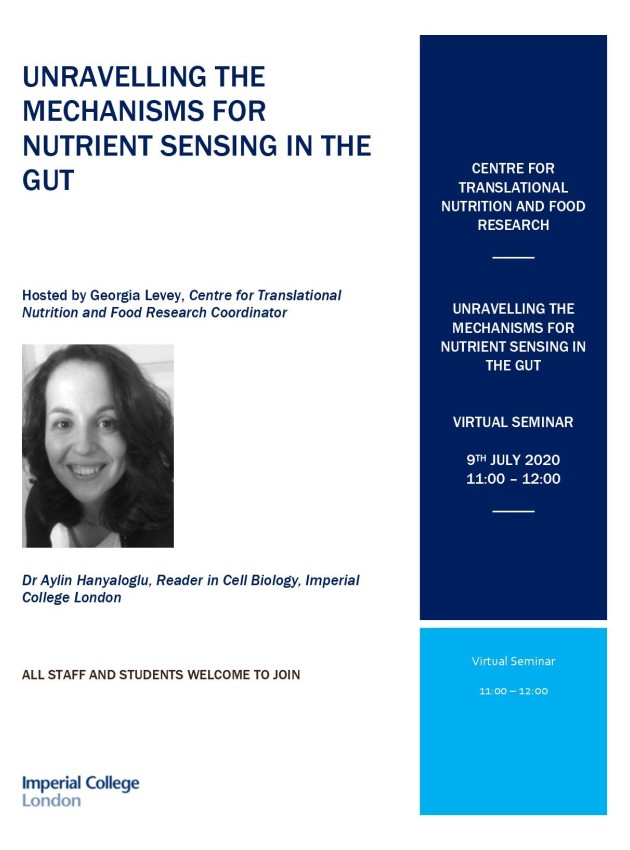 The Centre for Translational Nutrition and Food Research is proud to invite Dr Aylin Hanyaloglu from the Department of Metabolism, Digestion and Reproduction, Imperial College London to discuss 'unravelling the mechanisms for nutrient sensing in the gut'.
The Centre for Translational Nutrition and Food Research is proud to invite Dr Aylin Hanyaloglu from the Department of Metabolism, Digestion and Reproduction, Imperial College London to discuss 'unravelling the mechanisms for nutrient sensing in the gut'.
Aylin has a PhD in Molecular Endocrinology from University Western Australia and has work as a postdoc at University of California San Francisco. She joined Imperial College London in August 2007 as a Research Team Leader (G protein-coupled receptor (GPCR) Signalling Group) and Lecturer. Her research interests are understanding fundamental cell biological mechanisms regulating G protein-coupled receptor (GPCR) signal transduction and applying these mechanisms to understand the role of this superfamily of receptors in diverse physiological and pathophysiological systems.
Contact g.levey@imperial.ac.uk to access the recording.
Seminar: Engineering solutions to understand food intake, the Achilles heel of nutrition
--tojpeg_1592217351950_x2.jpg) The Centre for Translational Nutrition and Food Research is proud to invite Prof Gary Frost and Dr Benny Lo from Imperial College London. Gary and Benny will be discussing 'Engineering solutions to understand food intake, the Achilles heel of nutrition.'
The Centre for Translational Nutrition and Food Research is proud to invite Prof Gary Frost and Dr Benny Lo from Imperial College London. Gary and Benny will be discussing 'Engineering solutions to understand food intake, the Achilles heel of nutrition.'
Prof Gary Frost is currently head of the Section for Nutrition Research and leads the Imperial Centre for Transaltional Nutrition and Food Research. He qualified as a dietitian in 1982 and has always maintained a clinical input throughout his career. He was appointed to Professor of Nutrition and Dietetics at Imperial College Jan 2008. Prior to this, for 18 years Gary worked at Hammersmith Hospital. Over his time at Hammersmith he gained his PhD in Nutrition and was appointed Honorary Reader in Nutrition at Imperial College, then joined the University of Surrey as Professor of Nutrition and Dietetics in 2005.
Seminar: Cutting-edge chemical biology tools offer new insight into nutritional signaling
--tojpeg_1590489809937_x2.jpg)
The Centre for Translational Nutrition and Food Research is proud to invite Dr Maris Shchepinova from Imperial College to discuss cutting-edge chemical biology tools offer new insight into nutritional signaling.
Maria is a postdoctoral researcher at Imperial College London in the Department of Chemistry. She obtained her PhD in Glasgow in 2017 working on oxidative stress in mitochondria, and is currently working on novel chemical, chemogenetic and proteomic approaches to study short-chain fatty acid (SCFA) G-protein coupled receptors (GPCRs) involved in gut signaling in obesity and diabetes. Her research interests evolve around nutritional signaling, chemical proteomics and metabolomics, noncanonical GPCR signaling pathways in health and disease.
To watch the recorded seminar login with your college credentials here.
News: Food industry experts to turn cutting edge research into future food products
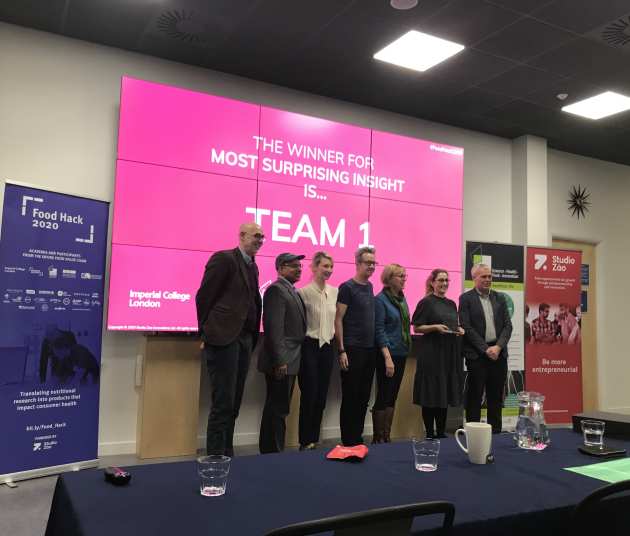 Experts from the food industry joined academics and entrepreneurs to explore how wrinkled peas could be turned into diabetes-fighting food products.
Experts from the food industry joined academics and entrepreneurs to explore how wrinkled peas could be turned into diabetes-fighting food products.
Food Hack 2020, held at Imperial College Advanced Hackspace (ICAH) at Imperial’s White City Campus, challenged participants to design, validate, and pitch new food products which could contribute to the fight against diabetes and cardiovascular disease.
Seminar: Healthy diets from sustainable food systems
--tojpeg_1582285291729_x2.jpg) The Centre for Translational Nutrition and Food Research is proud to invite Dr Marco Springmann from the University of Oxford to discuss healthy diets from sustainable food systems.
The Centre for Translational Nutrition and Food Research is proud to invite Dr Marco Springmann from the University of Oxford to discuss healthy diets from sustainable food systems.
Seminar details:
Date: Thursday 20th February 2020
Time: 12pm-1pm
Venue: Clinical Lecture Theatre - The Bays, Entrance 2, 2nd Floor, South Wharf Road, St Mary's Campus W2 1NY
Dr Marco Springmann is a senior researcher in the Centre on Population Approaches for Non-Communicable Disease Prevention in the Nuffield Department of Population Health, and leads the Centre’s programme on environmental sustainability and public health. He is interested in the health, environmental, and economic dimensions of the global food systems. He often uses systems models to provide quantitative estimates on food-related questions. Most recently, he was part of the EAT-Lancet Commission on Healthy Diets form Sustainable Food Systems.
Our food system is neither healthy, nor sustainable. Imbalanced diets, such as diets low in fruits and vegetables and high in red and processed meat, are the leading risk factor for mortality in the world and in most regions. On the other hand, agricultural production that underpins our diets is a major driver of climate change, land-use changes and biodiversity loss, freshwater depletion, as well as air and water pollution. In my talk, I detail these impacts, and discuss possible solutions, including dietary changes towards more plant-based diets, reductions in food loss and waste, and technological improvements and changes in management practices. I highlight how each actor along the food chain can play a role in transforming our current food system into one that stays within environmental limits and delivers healthy diets for a growing population.
To watch the recorded seminar login with your college credentials here.
News: Protein supplement could help weight loss after exercise
 Combining an appetite-supressing supplement with moderate exercise could help to burn fat faster, according to new research.
Combining an appetite-supressing supplement with moderate exercise could help to burn fat faster, according to new research.
The findings, published in the journal Metabolism, build on previous work looking at a supplement called inulin-propionate ester (IPE), which may help to reduce cravings for high-calorie foods and boost rates of fat oxidisation – the process by which the body ‘burns’ fat.
News: Study reveals link between soft drink consumption and increased risk of death
 Consumption of soft drinks is linked with higher rates of mortality, according to a new multinational European study.
Consumption of soft drinks is linked with higher rates of mortality, according to a new multinational European study.
The study, which involved over 450,000 participants from 10 European countries, found that those who drank two or more glasses of soft drinks, including sugar-sweetened and artificially sweetened soft drinks, per day had a higher risk of mortality from all causes than those who consumed less than one glass per month.
Seminar: Lifestyle health in preconception, pregnancy, and postpartum: Moving our evidence base into practice
--tojpeg_1573574341474_x2.jpg) The Centre for Translational Nutrition and Food Research is proud to invite Professor Helen Skouteris from Monash University, Australia to discuss lifestyle health in preconception, pregnancy, and postpartum.
The Centre for Translational Nutrition and Food Research is proud to invite Professor Helen Skouteris from Monash University, Australia to discuss lifestyle health in preconception, pregnancy, and postpartum.
Seminar details:
Date: Monday 9th December 2019
Time: 12pm-1pm
Venue: LEcture Theatre 1, Wolfson Centre, Hammersmith Campus
Helen Skouteris is the Monash Warwick Professor in Healthcare Improvement and Implementation Science. She is a developmental psychologist and expert in health behaviour change and women’s and children’s health, especially in relation to obesity prevention.
Helen works in implementation research and evaluation projects focused on improving health and developmental outcomes for women, children and adolescents. Her current research is around building active capacity in ‘the consumer’ to make healthy lifestyle choices across preconception, pregnancy, preschool, and childhood, including adolescence, to reduce the burden of obesity. She is the Director of the newly funded Centre of Research Excellence for Health in Preconception and Pregnancy: Prevention of Maternal Obesity"
Her work has also been focused extensively in community service and educational sector improvement – research that is critical to transforming policy across these sectors and translating to better health outcomes for children, young people, adults and families.
News: Genetic factors influencing adult obesity take effect in early childhood
 Body mass index (BMI) in infants, children and adults is influenced by different genetic factors that change as we age, according to a major new study
Body mass index (BMI) in infants, children and adults is influenced by different genetic factors that change as we age, according to a major new study
An international consortium of researchers, led by scientists at Imperial College London, the University of Surrey, and the University of Oulu, Finland, discovered that BMI in babies is influenced by a distinct set of genetic variants that play little role in determining weight in later life.
They found, however, that some genetic variants associated with adult BMI start playing a role during childhood from around the age of 4-7 years old – suggesting that the origins of obesity in adults may lie in this critical stage of childhood.
Centre for Translational Nutrition and Food Research Launch 8th October
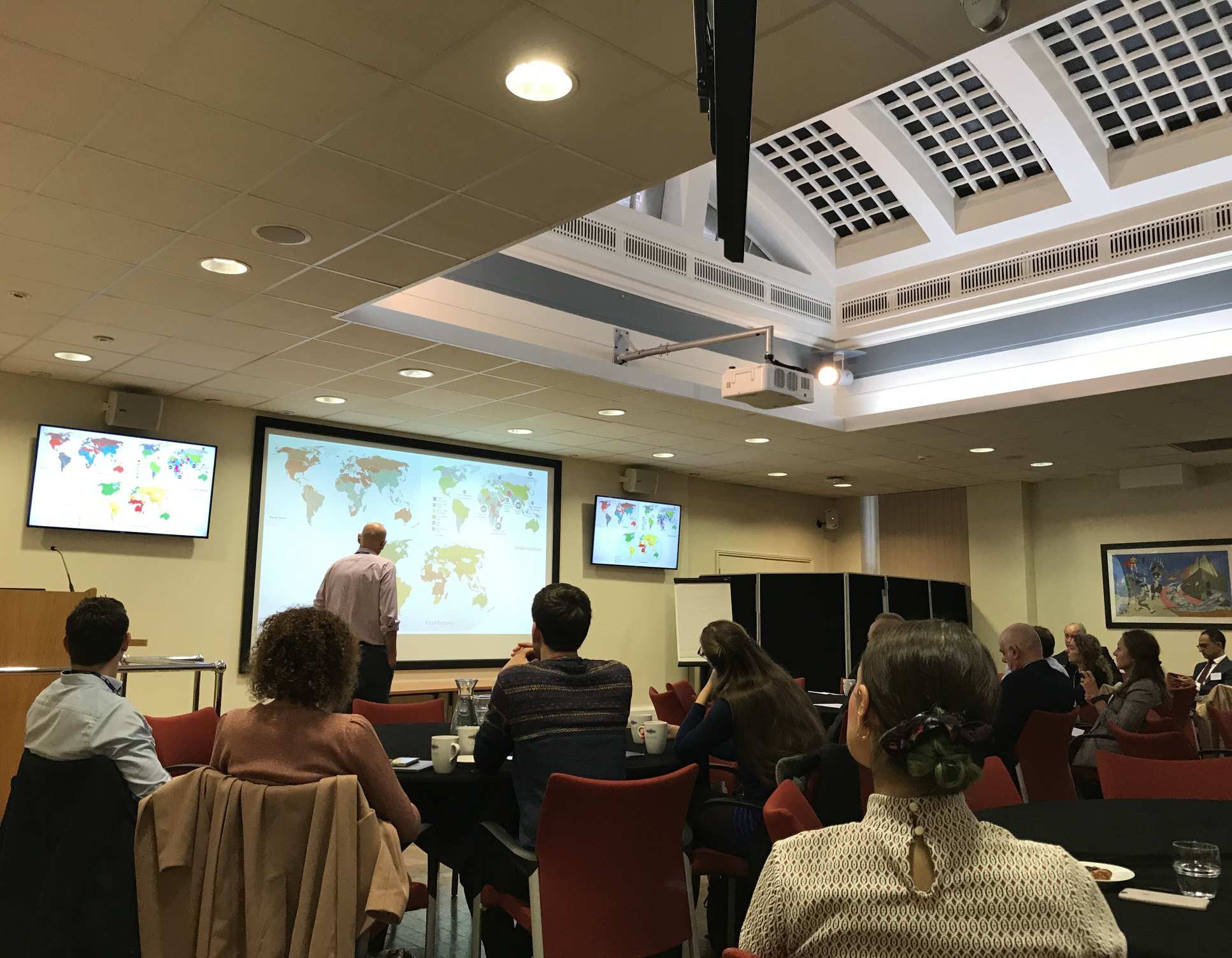 In December 2018 we gained Imperial Centre of Excellence status, forming the Centre for Translational Nutrition and Food Research, building on the work and success of what was formally the Nutrition and Food Network. The Centre brings together world leading research teams across Imperial College’s Faculties. Using multi-disciplinary approaches and cutting edge techniques the Centre extends the strength and capability of the research base to respond to key emerging global challenges in Nutrition, Food and Health.
In December 2018 we gained Imperial Centre of Excellence status, forming the Centre for Translational Nutrition and Food Research, building on the work and success of what was formally the Nutrition and Food Network. The Centre brings together world leading research teams across Imperial College’s Faculties. Using multi-disciplinary approaches and cutting edge techniques the Centre extends the strength and capability of the research base to respond to key emerging global challenges in Nutrition, Food and Health.
On the 8th October 2019 we held a Launch event which included an inspiring talk from Dr David Nabarro and an interactive workshop host by Professor Peter Childs (Head of the Dyson School of Design Engineering).
Seminar: Impacts of meat intake and meat-free dieting on cardio-vascular health: evidence from UK Biobank
 The Centre for Translational Nutrition and Food Research is proud to invite Dr Deborah Schneider-Luftman from Imperial College to discuss the impacts of meat intake and meat-free dieting on cardio-vascular health.
The Centre for Translational Nutrition and Food Research is proud to invite Dr Deborah Schneider-Luftman from Imperial College to discuss the impacts of meat intake and meat-free dieting on cardio-vascular health.
Seminar details:
Date: Thursday 5th September 2019
Time: 1pm – 2pm
Venue: Seminar Room 1 & 2, Wolfson Building, Hammersmith Campus
Dr Schneider-Luftman is a UK Med-Mio Fellow in Biostatistics, working at Imperial College London in the Epidemiology & Biostatistics department. She completed her PhD in multivariate Statistics in 2016, and has worked in Public Health research ever since. Her interests evolve around multivariate analysis, statistical methodology, cardio-vascular epidemiology, and nutritional epidemiology of veganism.
News: New hormone injection aids weight loss in obese patients
 An injection has helped reduce body weight and glucose levels in patients with diabetes and obesity in four weeks.
An injection has helped reduce body weight and glucose levels in patients with diabetes and obesity in four weeks.
The findings came from a small study in which patients lost on average 4.4kg and the treatment led to substantial improvements to their blood glucose, with some patients’ reducing to near-normal levels.
News: Salt rules linked to 9900 cases of cardiovascular disease and 1500 cancer cases
 A relaxation of UK food industry regulation has been linked with 9,900 additional cases of cardiovascular disease, and 1,500 cases of stomach cancer.
A relaxation of UK food industry regulation has been linked with 9,900 additional cases of cardiovascular disease, and 1,500 cases of stomach cancer.
Researchers from Imperial College London and the University of Liverpool analysed the salt intake of the population in England over thirteen years to compare the effect of changes in regulations on how much salt manufacturers can use in their products.
Seminar: Vegetarian diets and plant foods for chronic disease prevention
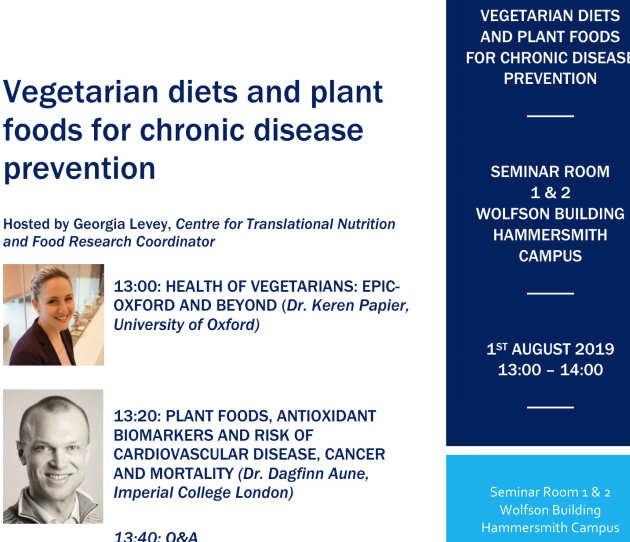 The Centre for Translational Nutrition and Food Research is proud to invite Dr Dagfinn Aune from Imperial College London and Dr Keren Papier from the University of Oxford to discuss Vegetarian diets and plant foods for chronic disease prevention.
The Centre for Translational Nutrition and Food Research is proud to invite Dr Dagfinn Aune from Imperial College London and Dr Keren Papier from the University of Oxford to discuss Vegetarian diets and plant foods for chronic disease prevention.
Seminar details:
Date: Thursday 1st August 2019
Time: 1pm – 2pm
Venue: Seminar Room 1 & 2, Wolfson Building, Hammersmith Campus
Dr Dagfinn Aune is a postdoctoral researcher in the Department of Epidemiology and Biostatistics in the School of Public Health of Imperial College London and an associate professor at Bjørknes University College in Oslo, Norway. He completed his PhD at the Norwegian University of Science and Technology in 2016 and has a MSc in Nutrition from the University of Oslo from 2008. Since 2010 he has worked for several years in the Continuous Update Project of the World Cancer Research Fund, updating systematic reviews and meta-analyses on diet, anthropometry, physical activity and cancer risk and has contributed to the Third Expert Report "Diet, Nutrition, Physical Activity and Cancer: A Global Perspective" which was published in May 2018. He has also worked on systematic reviews and meta-analyses within other areas of public health as well as on projects in the EPIC-study, HUNT-study, and in South American case-control studies. His main research interests are on the relationships between diet, adiposity, physical activity and smoking and risk of cardiovascular disease, cancer, type 2 diabetes, pregnancy complications and premature mortality.
Dr Keren Papier is a postdoctoral nutritional epidemiologist in the Cancer Epidemiology Unit at The University of Oxford. Her current research with the LEAP Project (Livestock, Environment and People) examines the relationship between animal sourced foods and health outcomes in the EPIC-Oxford Study and the UK Biobank Study. Prior to coming to Oxford, Keren completed a doctoral degree in Epidemiology at the National Centre for Epidemiology and Population Health at the Australian National University, for which she assessed the incidence and risk factors of emerging type 2 diabetes mellitus in Thailand. She also holds a Bachelor of Public Health Nutrition with first class Honours from Griffith University. Keren’s research interests include assessing diet and lifestyle and examining their role in the development of chronic diseases and premature mortality. Her international research settings have included Australia, Thailand, the Philippines, and the UK.
News: Experts gather in Nairobi to explore the influence of undernutrition on gut health
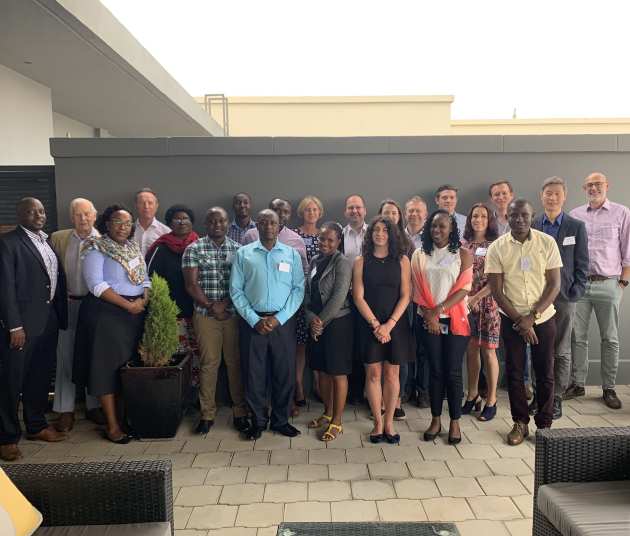 On the 23rd and 24th July a multidisciplinary group of experts gathered in Nairobi, Kenya to discuss the role of undernutriton in gut health. The team includes Imperial College researchers Prof Gary Frost, Prof Kath Maitland, Dr Jon Swann, Dr Alex Thompson.
On the 23rd and 24th July a multidisciplinary group of experts gathered in Nairobi, Kenya to discuss the role of undernutriton in gut health. The team includes Imperial College researchers Prof Gary Frost, Prof Kath Maitland, Dr Jon Swann, Dr Alex Thompson.
News: Food freshness sensors could replace ‘use-by’ dates to cut food waste
 Imperial academics have developed low-cost, smartphone-linked, eco-friendly spoilage sensors for meat and fish packaging.
Imperial academics have developed low-cost, smartphone-linked, eco-friendly spoilage sensors for meat and fish packaging.
The researchers say the new sensors could help detect spoilage and reduce food waste for supermarkets and consumers.
Seminar: Vitamin D in the prevention and treatment of respiratory infections
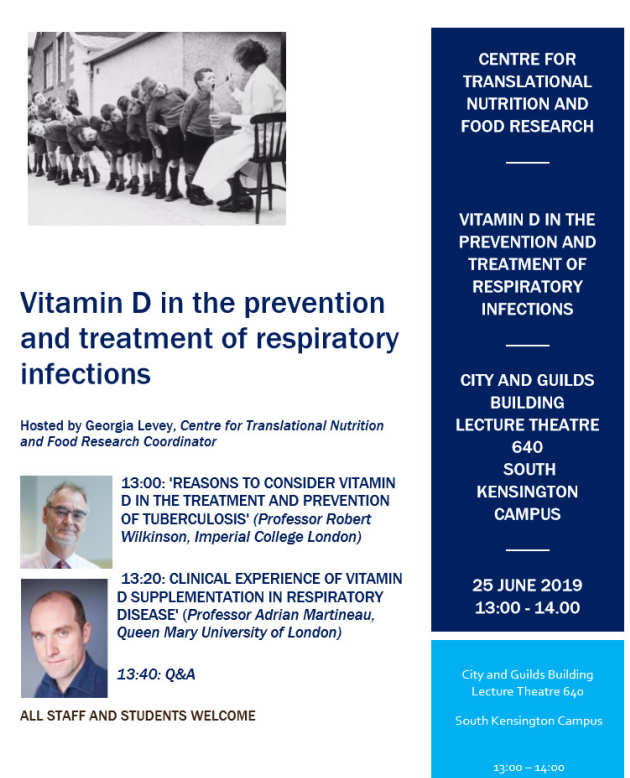 The Centre for Translational Nutrition and Food Research is proud to invite Professor Robert Wilkinson from Imperial College and Professor Adrian Martineau from Queen Mary University of London and to discuss 'Vitamin D in the prevention and treatment of respiratory infections'.
The Centre for Translational Nutrition and Food Research is proud to invite Professor Robert Wilkinson from Imperial College and Professor Adrian Martineau from Queen Mary University of London and to discuss 'Vitamin D in the prevention and treatment of respiratory infections'.
Date: 25th June 2019
Time: 1pm - 2pm
Venue: City and Guilds Building Lecture Theatre 640, South Kensignton Campus
Robert J Wilkinson is a Professor in Infectious Diseases at Imperial and a Group Leader at the Francis Crick Institute. Much of his research is conducted at the University of Cape Town South Africa where he is an Honorary Professor of Medicine and directs that institution’s Wellcome Centre for Infectious Diseases Research in Africa. Wilkinson has contributed a number of articles on tuberculosis and HIV-associated tuberculosis.
Adrian Martineau is Clinical Professor of Respiratory Infection and Immunity at Queen Mary University of London. Adrian joined Queen Mary as a lecturer in Respiratory Medicine in 2002, and established a programme of laboratory and clinical research into the immunomodulatory actions of vitamin D in tuberculosis. He received his PhD in 2010, and is currently conducting clinical trials of vitamin D supplementation to prevent respiratory infections and non-communicable diseases in the UK, South Africa and Mongolia.
News: Obesity rising faster in rural areas than cities
 Obesity is increasing more rapidly in the world’s rural areas than in cities, according to a new study of global trends in body-mass index (BMI).
Obesity is increasing more rapidly in the world’s rural areas than in cities, according to a new study of global trends in body-mass index (BMI).
The research, led by Imperial College London and published in Nature, analysed the height and weight data of more than 112 million adults across urban and rural areas of 200 countries and territories between 1985 and 2017.
Seminar: Gut microbiome and metabolomics approaches for nutrition and fitness research
 The Centre for Translational Nutrition and Food Research is proud to invite Dr Orla O'Sullivan from Teagasc Food Research Centre and Dr Isabel Garcia Perez from Imperial College to discuss the influence of diet and fitness on the human gut microbiome.
The Centre for Translational Nutrition and Food Research is proud to invite Dr Orla O'Sullivan from Teagasc Food Research Centre and Dr Isabel Garcia Perez from Imperial College to discuss the influence of diet and fitness on the human gut microbiome.
Date: 9 May 2019
Time: 11.00 - 12.00
Venue: City and Guilds Builiding Lecture Theatre 640
Campus: South Kensington Campus
Dr. Orla O’Sullivan is a computational biologist at Teagasc Food Research Centre and a senior investigator with APC Microbiome Ireland. Her research focuses on elucidating the microbiome from various environments including human gut and lung, rumen and food. Of particular interest to her is the role of physical fitness and diet on the human gut microbiome both in healthy and diseased cohorts.
Dr. Isabel Garcia Perez is a Lecturer in Precision and Systems Medicine, in the Department of Surgey and Cancer at Imperial College London and NIHR Research Fellow. Isabel is an expert in analytical chemistry and metabolic profiling and has developed clinical trial methods for nutritional and exercise studies. Her main passion is the development of tools for monitoring individuals and their response to diet and lifestyle interventions.
News: Managing severe malnutrition: It takes more than calories
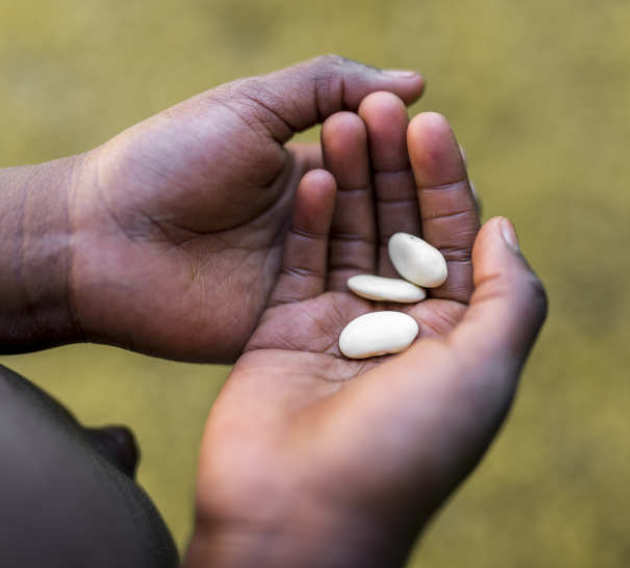 Scientists from Imperial and beyond discuss the latest research and developments on the management of severe malnutrition.
Scientists from Imperial and beyond discuss the latest research and developments on the management of severe malnutrition.
News: Researcher urges food industry to reduce salt in food
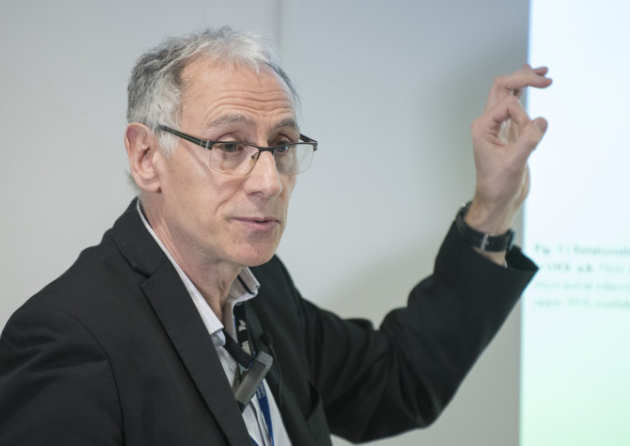 The food industry must do more to lower the amount of salt in their products in order to tackle high blood pressure, says an Imperial expert.
The food industry must do more to lower the amount of salt in their products in order to tackle high blood pressure, says an Imperial expert.
Professor Paul Elliott, Chair in Epidemiology and Public Health Medicine at Imperial College London, talked about his work on how salt contributes to raised blood pressure, and strategies to tackle high salt consumption, at the Imperial College Academic Health Science Centre (AHSC) seminar. He was joined by Professor Neil Poulter, Honorary Consultant Physician at Imperial College Healthcare NHS Trust and Professor of Preventive Cardiovascular Medicine at the College, who talked about his work on raising awareness of the impact of raised blood pressure.
News: Pre-announcement: Call for Industry-led Innovations to Tackle Childhood Obesity
The STOP Consortium, in collaboration with EIT Health and EIT Food, will launch a call for industry-led projects aimed at developing innovations that have the potential to curb childhood obesity in Europe, either by making critical improvements in the food environments faced by children and their families, or by increasing children’s fitness and physical activity. The call will be launched by the end of April 2019.
News: Imperial researchers call for urgent action to tackle obesity epidemic
 There is an urgent need for new dietary approaches and treatments to tackle the global health crisis of obesity in children and adults say experts.
There is an urgent need for new dietary approaches and treatments to tackle the global health crisis of obesity in children and adults say experts.
The worldwide prevalence of obesity has nearly tripled between 1975 and 2016 and experts say that more needs to be done to make healthy, nutritious food more available at home and school, especially in poor families and communities. Regulations and taxes to protect children from unhealthy foods are also needed.
News: DNA test and phone app to ‘nudge’ Waitrose shoppers towards healthier food
 A new app, developed by Imperial start-up DnaNudge, will use shoppers’ DNA to help them make healthier choices while food shopping.
A new app, developed by Imperial start-up DnaNudge, will use shoppers’ DNA to help them make healthier choices while food shopping.
In the first study of its kind, researchers at Imperial College London will study the effects of DNA-personalised food choices on health outcomes for people with pre-diabetes.
News: Could personalised 'food passports’ help to boost health and tackle obesity?
 Combining AI technology, personal data and culinary know-how could help to keep the population healthier for longer.
Combining AI technology, personal data and culinary know-how could help to keep the population healthier for longer.
In a concept which brings a bit of science fiction to the dining table, researchers at Imperial are investigating how incorporating data from our genome with how we perceive the food we eat could lead to more personalised meals, which could also help to tackle climbing rates of chronic conditions like obesity, cancer and diabetes.
News: Early puberty linked with increased risk of obesity for women
 Girls who start puberty earlier are more likely to be overweight as adults, finds new research from Imperial College London.
Girls who start puberty earlier are more likely to be overweight as adults, finds new research from Imperial College London.
The researchers say their findings, published today in the International Journal of Obesity, strengthen existing evidence of a link between the onset of puberty and a woman’s body mass in adulthood.
Previous studies have established a link between obesity and puberty, with increased body weight known to be a risk factor for girls starting puberty earlier.
However, these observational findings can be influenced by situational factors, such as ethnicity, economic background, education level, and diet, making it difficult to determine whether early puberty or these other factors are the cause.
Seminar: New understanding around nutrition, inflammation and metabolism

The Nutrition and Food Network is proud to invite Professor Helen Roche from University College Dublin (UCD) and Dr Kevin Woollard from Imperial College to discuss the effect of inflammation and metabolism on nutrition.
Date: 20 April 2018
Time: 12.00 - 14.30
Venue: Lecture Theatre 3, Wolfson
Campus: Hammersmith Campus
Professor Roche is the Associate Professor of Nutrigenomics based at the Conway Institute, UCD in Ireland within the Food & Health Theme. She established the first Nutrigenomics research group in Ireland, at the Institute of Molecular Medicine at Trinity College Dublin.
Dr Kevin Woollard is the group leader in the Renal and Vascular Inflammation Section, Department of Medicine at Imperial College. His interests are in understanding monocyte biology during vascular inflammation, particularly their contribution to cardiovascular and kidney disease.
The seminar is chaired by Professor Gary Frost (Chair in Nutrition and Dietetics).
Light refreshments will be provided prior to the seminar with an opportunity to meet the speakers.
Everyone welcome
Schedule
- 12:00 - Welcome lunch in the the Wolfson Resturant, Commonwealth building
- 12:30 - Welcome from Gary Frost
- 12:35 - Professor Helen Roche on 'Nutritional modulation of metabolic-inflammation', followed by Q&A
- 01:30 - Dr Kevin Woollard on 'Lipids and lipaemia can modulate monocyte activity', followed by Q&A
Davos: Imperial academics present food solutions to world leaders
Imperial academics from the NFN joined global leaders at the World Economic Forum in Davos to discuss innovative ideas around nutrition and food production. Professor Gary Frost, Chair in Nutrition and Dietetics, Dr Marisa Miraldo Associate, Associate Professor in Health Economics and Dr Laura Barter, Director of AGRI-net and the Agri-Future Lab discussed how science and technology can play a key role in solving global challenges.
Read more about this year's World Economic Forum, which focused on "Creating a shared future in a fractured world".
Read more about the research carried out by a some of the members of NFN and how we are working together to solve global challenges.
Prof. Gary Frost from the Faculty of Medicine described how under- and over-nutrition are two sides of the same coin and how his work on guts will help to treat them both.
Dr Marisa Miraldo from the Business School talked about personalised interventions to effectively improve people eating habits.
Dr Laura Barter from the Faculty of Natural Sciences illustrated how her study of a key enzyme involved in photosynthesis will allow us to increase the crop yield.
Symposium: New Tools In Molecular Nutrition

The Nutrition and Food Network is proud to announce the first of a series of symposiums in Nutrition and Food to be held at the new White City Campus on Friday 16th March. This half-day symposium brings together experts from Medicine and Chemistry who will discuss what future holds for us in the field of Molecular Nutrition.
- Dr Aylin Hanyaloglu Senior Lecturer and Research Team Lead of the G protein-coupled receptor (GPCR) Signalling Group will talk about new techniques and understanding in G-protein coupled receptor physiology.
- Dr Filipe Cabreiro Principal Investigator of the Cabreiro Lab from UCL will be exploring 4-way drug-nutrient-microbe-host interactions using C-elegan and how understanding these interactions can improve human health.
- Dr Katia Karalis from Emulate Inc., Boston will talk about new advances in organ-on-a-chip technology and how this technology could be used for precision medicine and personalised health.
- Prof Zoltan Takats Professor of Analytical Chemistry as pursued pioneering research in mass spectrometry and he is one of the founders of the field of Ambient Mass Spectrometry and he will discuss new techniques for tracking metabolism.
Full details can be found on the Faculty of Medicine Events page.
Registration is open from 09.00. A light lunch will be provided following the talks with an opportunity to meet the speakers.
Staff and students from Imperial College are welcome and all attendees must register on Eventbrite in advance.
Seminar: How well targeted are soda taxes?
In collaboration with the NFN the Centre for Health Economics & Policy Innovation is proud to invite Professor Rachel Griffith from the University of Manchester who will be discussing soda taxes and their effectiveness in reducing excess sugar intake.
Abstract:
Soda taxes aim to reduce excessive sugar consumption. Their effectiveness depends on whether they target individuals for whom the harm of consumption is largest. We estimate demand and account for supply-side equilibrium pass-through. We exploit longitudinal data to estimate individual preferences, which allows flexible heterogeneity that we relate to a wide array of individual characteristics. We show that soda taxes are effective at targeting young consumers but not individuals with high total dietary sugar; they impose the highest monetary cost on poorer individuals but are unlikely to be strongly regressive if we account for averted future costs from over-consumption.
Location: LG19A, Imperial College Business School, South Kensington
Date: 20 February 2018 15:00 to 16:00
Refreshments will be provided.
For enquiries, please contact Dr Jack Olney
Launch of the Nutrition and Food Network - September 2017
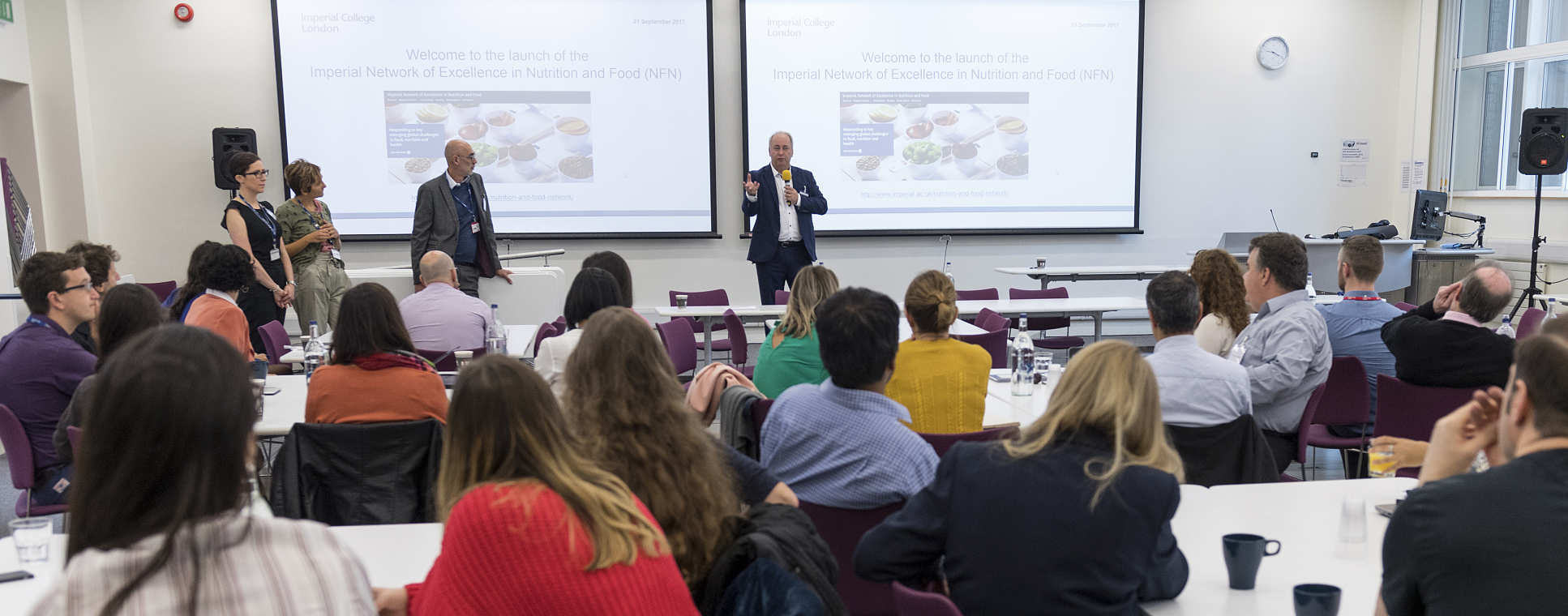
Imperial College is proud to announce the launch of the Network of Excellence in Nutrition and Food (NFN). The launch of the Network was attended by staff from across the Faculties of Medicine, Life Sciences, Engineering and the Business School. The Network aims to tackle some of the major health issues the world is facing relating to food and nutrition by drawing on the expertise of researchers making the College a beacon for nutrition and food research.
The Network is about bringing people from diverse backgrounds to focus on ever-increasing burdening problems associated with food, nutrition and health. Although people have been working in the space of Nutrition for many years, Imperial is not overtly known for this and the Network aims to facilitate innovation within Network and highlight this work in a given space so that we have a window that the rest of the world can see – Imperial plays an important role in nutritional discovery.




